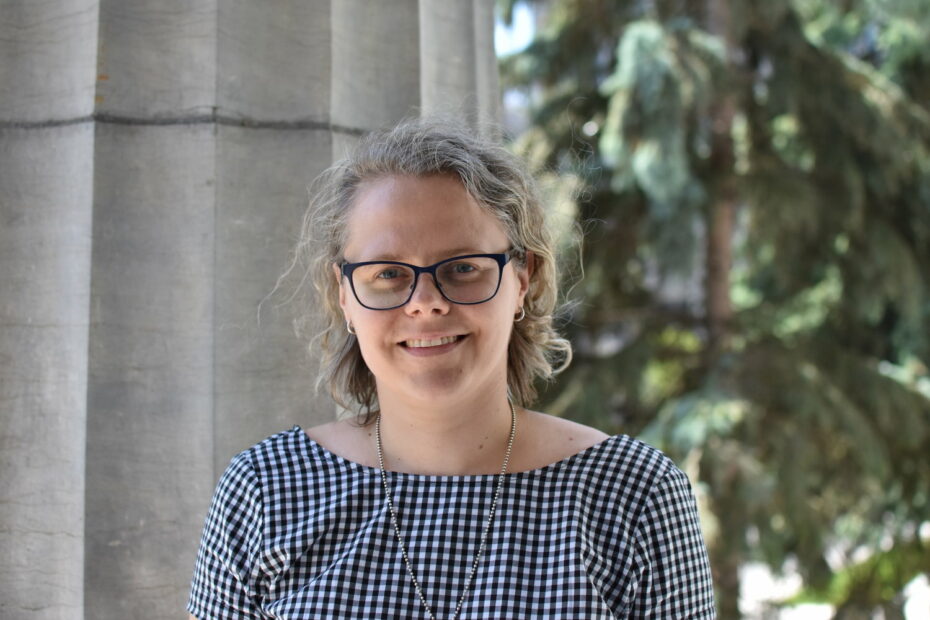
Audrey Moores remembers the exact moment that chemistry won her over. She was 12 years old, in school in her native France when her chemistry teacher asked for a volunteer to help him with a demonstration of the solid state reaction of iron and sulphur powders followed by hydrochloric acid.
“I was the only one in the class to agree to hold the test tube,” says Moores, noting the resulting reaction, a “really gross rotten egg smell,” was the catalyst for her future career. “Since then I was convinced I’d work in chemistry,” she says.
Moores’ fascination with chemical reactions resulted in a singular honour last week, when she won the Canadian Chemistry and Chemical Engineering Award for Green Chemistry.
Sponsored by The Canadian Society for Chemistry, the award “is presented to an individual working in Canada who has made significant contributions to advance green chemistry and/or engineering, including the technical, human health and environmental benefits.”
Green chemistry better for people and the environment
Moores, an Associate Professor in the Department of Chemistry, is a leading expert in the field of catalysis using metal, metal oxide and biomass-based nanomaterials.
“For the last 14 years here at McGill, my research group has been working on designing chemical processes which are greener for the environment and safer for our health,” says Moores. “We have focused on two main areas of research: How can we make better catalysts, these little additives we use in chemistry to make reactions be more efficient; and how can we design better materials and make them more sustainably.”
“For instance, we are using the power of light to enhance the performance of our catalysts and allow them to work with less energy input,” she continues. “In another example, we have pioneered the fabrication of nanomaterials – used for cancer detection, for instance – by methods drastically reducing or eliminating the use of toxic or wasteful solvents. More recently, with the support of the McGill Sustainability Systems Initiative, we have developed an integral research scheme to test the toxicity and assess nanomaterial for their greenness.”
Moores’ passion for the field stems from her belief that Green Chemistry is a crucial tool in addressing some of the world’s most pressing problems.
“Green Chemistry is absolutely central in solving some of the most important challenges facing us,” she says. “Whether you look at global warming, plastic pollution or the way we exploit natural resources, chemistry is at the heart of the question and will have to be the solution.”
Mentors, guides and inspirations
Moores says she is fortunate to have had so many mentors to guide and encourage her.
“I’ve had a few fabulous chemistry teachers over the years, in high school and the equivalent of CEGEP in France,” she says. “They really pushed and inspired me … to never give up my dream to become a chemist.”
Her passion for Green Chemistry was stoked by scholars such as her PhD supervisor Pascal Le Floch and her Postdoc advisor Robert H. Crabtree. Encouraged by the latter, Moores attended a “Green Chemistry summer school” in 2006. It proved to be a seminal moment in her burgeoning career. “There, I met Paul Anastas, one of the two founders of the Green Chemistry movement, a lot of its most influential practitioners, as well as a lot of young chemists like me who later became leaders in the field,” she says.
Not surprisingly, when asked about her reaction to winning the Green Chemistry Award, Moores shares the spotlight.
“Well, I was a little shocked and really honoured. This award has acknowledged a lot of amazing researchers before me, including my friend and colleague at McGill, C.J. Li,” she says.
“I first thought of all the wonderful people with whom I have had the pleasure to work with over the years, post-docs, graduate students and undergraduate students… Close to 90 people have tirelessly contributed their curiosity, ingenuity, hard work and passion. Frankly, none of it would have been possible without them and I share this award with them, as a celebration of their talent.”
Inspire others to fulfill their dreams
Working in a field traditionally dominated by men, Moores was lucky to receive a lot of support, but she acknowledged that women still face challenges in their careers.
“Thankfully things are changing, barriers are being broken, but we must continue to work on it,” says Moores, who has been an important figure at McGill to improve access to family care support for students and staff alike (“an important issue to address to ensure equity”).
Asked for words of advice girls and young women thinking about pursuing a career in science, Moores tells them to “be curious and bold and to believe in themselves.”
But it is also crucial that established scientists and researchers do their part to nurture the people who will, one day, carry the torch forward.
“It is essential to inspire younger generations,” she says, speaking both as a leader in her field and as that 12-year-old student holding a test tube for her teacher back in France, “so that they too can dream of becoming chemists.”

Congratulations!
I am so happy for you, Audrey! Congratulations!